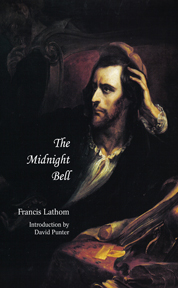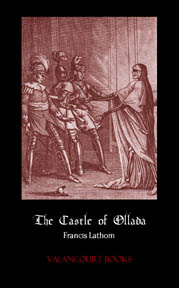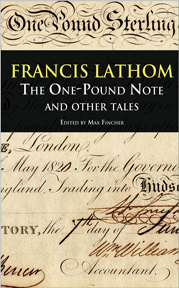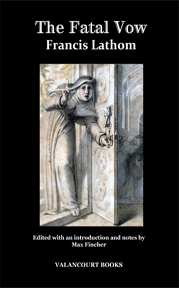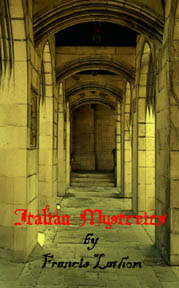
Italian Mysteries (1820)
Francis Lathom
Reprint of the 1820 edition
"He drew aside the covering which concealed the face of the subject ... guess, if you can, the horror, the astonishment, when, in the countenance of the deceased, I beheld my own mother!"
The worthy doctor Urbino di Cavetti is kidnapped and led blindfolded to the bedside of a young woman. A mysterious nobleman offers him an immense fortune if he will consent to cure her...of her life! Horrified, Urbino refuses to murder her, and must flee his native Venice with his family to avoid the powerful stranger's vengeance.
They flee to the isolated Castello della Torvida, which local peasants affirm to be haunted. But the spectre the servants see and the supernatural warnings the family receives are the least of their worries when Urbino's niece, the lovely Paulina, is kidnapped by the lascivious Marchese di Valdetti.
Confined a prisoner in Valdetti's castle, Paulina must choose: become the Marchese's wife, or fall victim to his insatiable lust! Can her friends penetrate the mysteries of the haunted castle and save Paulina in time?
With a colourful cast of characters and an intricate plot, Italian Mysteries was among Francis Lathom's most successful Gothic novels. This edition, the first since 1820, includes a new introduction and explanatory notes for modern readers.
Francis Lathom
Reprint of the 1820 edition
"He drew aside the covering which concealed the face of the subject ... guess, if you can, the horror, the astonishment, when, in the countenance of the deceased, I beheld my own mother!"
The worthy doctor Urbino di Cavetti is kidnapped and led blindfolded to the bedside of a young woman. A mysterious nobleman offers him an immense fortune if he will consent to cure her...of her life! Horrified, Urbino refuses to murder her, and must flee his native Venice with his family to avoid the powerful stranger's vengeance.
They flee to the isolated Castello della Torvida, which local peasants affirm to be haunted. But the spectre the servants see and the supernatural warnings the family receives are the least of their worries when Urbino's niece, the lovely Paulina, is kidnapped by the lascivious Marchese di Valdetti.
Confined a prisoner in Valdetti's castle, Paulina must choose: become the Marchese's wife, or fall victim to his insatiable lust! Can her friends penetrate the mysteries of the haunted castle and save Paulina in time?
With a colourful cast of characters and an intricate plot, Italian Mysteries was among Francis Lathom's most successful Gothic novels. This edition, the first since 1820, includes a new introduction and explanatory notes for modern readers.
|
BOOK DETAILS
Trade paper ISBN-13: 978-0976604860 List Price: $22.99 U.S. Pages: 408 Published: 2005 |
|
ALSO AVAILABLE THROUGH ONLINE RETAILERS
MORE TITLES BY THIS AUTHOR
SEE THE COMPLETE LIST OF TITLES HERE
AUTHOR BIOGRAPHY
Francis Lathom (1774-1832) was born in July 1774 at Rotterdam to Henry and Sarah Lathom. Henry Lathom was a Norwich merchant engaged in business with the East India Company in Holland. Around 1777, the family returned to the vicinity of Norwich, and in the 1790s Lathom began to pen plays for the Theatre Royal Norwich, including the comedies All in a Bustle (1795) and The Dash of the Day (1800), the latter of which was acted to “universal applause” and ran into at least four editions. In 1795, Lathom published his first novel, The Castle of Ollada, a Gothic romance indebted to Ann Radcliffe’s The Mysteries of Udolpho (1794) and Walpole’s The Castle of Otranto (1764).
In 1797, Lathom married Diana Ganning, daughter of Daniel Ganning, a wealthy lawyer and landowner, with whom he had three children, Henry Daniel (b. 1799), Frederick (b. 1800), and Jessy Ann (b. 1803). The following year, he published what became his most famous novel, The Midnight Bell (1798), which was mentioned in Jane Austen’s Northanger Abbey (1818) and which was the only of Lathom’s novels reprinted in the 20th century. He followed this success with the satire Men and Manners (1799), described by critic Montague Summers as Lathom’s masterpiece and worthy of a young Dickens, and Mystery (1800), a curious mixture of the Gothic with epistolary domestic romance.
Around 1802 or 1803, under circumstances not yet known, Lathom left Norwich, perhaps for Scotland. Lathom’s father’s will provided him an annuity of £200 per year, provided that he relinquish custody of his children to Diana and have nothing more to do with them. Summers posited that Lathom’s removal from Norwich may have stemmed from a gay love affair, which, while not substantiated, may nonetheless be true.
Between 1802 and 1809, Lathom was extremely prolific, publishing the novels Astonishment!!! (1802), The Impenetrable Secret, Find it Out! (1805), The Mysterious Freebooter (1806), Human Beings (1807), The Fatal Vow (1807), The Unknown (1808), London, or, Truth Without Treason (1809), and The Romance of the Hebrides, or, Wonders Never Cease (1809). After 1809, he disappeared from the publishing scene and apparently travelled to America, where he visited New York and lived for a time in Philadelphia.
In 1820, Lathom returned to publishing, releasing Italian Mysteries and the collection The One-Pound Note and Other Tales. He continued to write throughout the remainder of the decade; these later works include Live and Learn (1823), in which the friendship between the two male characters was felt by Summers to be “clearly” queer in nature, as well as two additional collections of short stories and the novels Young John Bull (1828) and Mystic Events (1830). Lathom is said to have died in Fyvie, Aberdeenshire, Scotland in 1832.
In 1797, Lathom married Diana Ganning, daughter of Daniel Ganning, a wealthy lawyer and landowner, with whom he had three children, Henry Daniel (b. 1799), Frederick (b. 1800), and Jessy Ann (b. 1803). The following year, he published what became his most famous novel, The Midnight Bell (1798), which was mentioned in Jane Austen’s Northanger Abbey (1818) and which was the only of Lathom’s novels reprinted in the 20th century. He followed this success with the satire Men and Manners (1799), described by critic Montague Summers as Lathom’s masterpiece and worthy of a young Dickens, and Mystery (1800), a curious mixture of the Gothic with epistolary domestic romance.
Around 1802 or 1803, under circumstances not yet known, Lathom left Norwich, perhaps for Scotland. Lathom’s father’s will provided him an annuity of £200 per year, provided that he relinquish custody of his children to Diana and have nothing more to do with them. Summers posited that Lathom’s removal from Norwich may have stemmed from a gay love affair, which, while not substantiated, may nonetheless be true.
Between 1802 and 1809, Lathom was extremely prolific, publishing the novels Astonishment!!! (1802), The Impenetrable Secret, Find it Out! (1805), The Mysterious Freebooter (1806), Human Beings (1807), The Fatal Vow (1807), The Unknown (1808), London, or, Truth Without Treason (1809), and The Romance of the Hebrides, or, Wonders Never Cease (1809). After 1809, he disappeared from the publishing scene and apparently travelled to America, where he visited New York and lived for a time in Philadelphia.
In 1820, Lathom returned to publishing, releasing Italian Mysteries and the collection The One-Pound Note and Other Tales. He continued to write throughout the remainder of the decade; these later works include Live and Learn (1823), in which the friendship between the two male characters was felt by Summers to be “clearly” queer in nature, as well as two additional collections of short stories and the novels Young John Bull (1828) and Mystic Events (1830). Lathom is said to have died in Fyvie, Aberdeenshire, Scotland in 1832.

